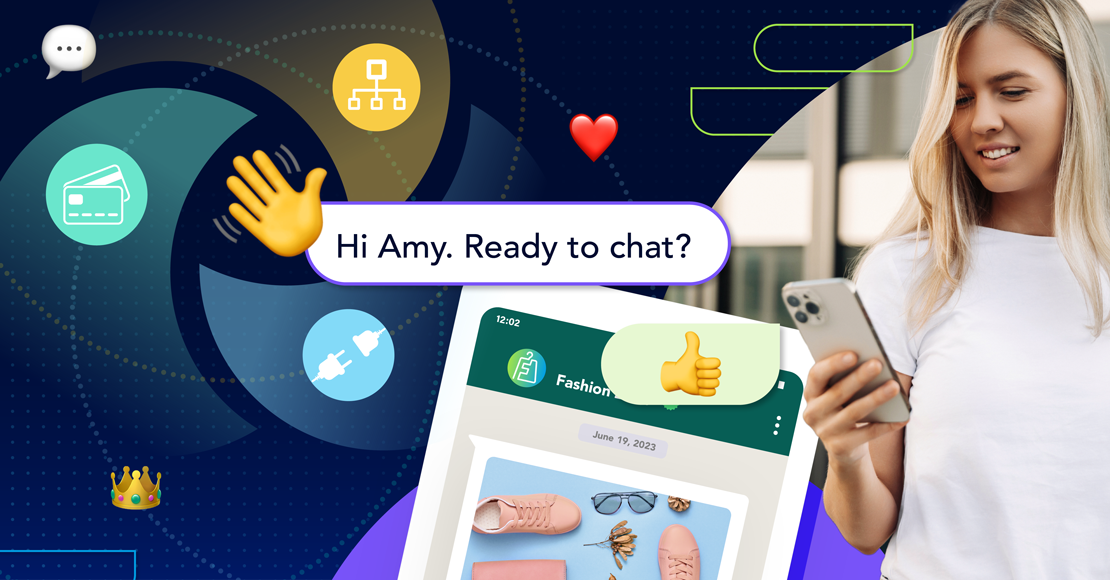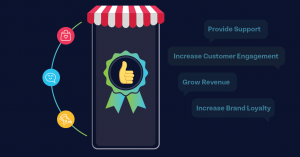
AI in B2B marketing
Artificial Intelligence (AI) is no longer the stuff of science-fiction films and novels, it’s happening now in the real world and has many unique applications. These include B2B commerce and B2B communication. AI can be used not only to enhance the B2B selling process but can also simplify B2B communication, making it more efficient and effective.
Suggestive selling
Consumers have adapted to a high level of self-directed searching and purchasing, and B2B buyers have come to expect the same convenience. Artificial intelligence is necessary for businesses to anticipate a buyer’s needs by analyzing their past purchases, and this can be applied in B2B commerce too.
It’ll allow you to automate the marketing process and make reordering easier and more efficient. Businesses can suggest add-ons and other accessories to their B2B clients using this type of ‘suggestive selling’. An AI system can analyze the client’s purchasing habits as well as organization-wide sales patterns in order to determine the perfect point in the buyer’s journey to suggest add-ons, rather than waiting for the final point of sale. Think of how powerful a system like Netflix’s ‘suggestive selling’ (yes, we’re still watching) could be for your B2B sales.
Improved B2B commerce and B2B communication strategies
A recent report showed that a large number of B2B customers would look elsewhere if a brand did not accurately anticipate their ‘pain points’. Artificial intelligence will help provide the right source and quantity of data that will aid in crafting better strategies to analyze and anticipate the behavior of their clients.
For B2B commerce and B2B communication, AI could help businesses pinpoint wherein the buyer’s journey to deliver solutions. With the introduction of machine learning, these results can be achieved in a cost-effective way, allowing businesses to maintain brand loyalty and deliver on their promises to B2B customers. The improved strategies will also mean that targeted KPIs are hit successfully.
B2B marketing allows your brand to get personal
As a B2B business, you often have to craft unique emails and SMS marketing campaigns to send to clients, and this can take hours when done correctly. You need to include your background information, an understanding of your clients’ personal history, and some details about how your product or service is the perfect fit for them.
It might seem counterintuitive to lose the ‘human touch’ from B2B communication, but opting instead for artificial intelligence will allow you to personalize your communication tenfold. AI will be able to use the data collected about the client’s professional history to craft highly tailored communications, and with the use of customer segmentation, it can help you customize your brand’s message to be on point with other B2B businesses. This also encourages a long-term, organic relationship with your clients.
Related: How to make the most of SMS for B2B marketing
Use of real-time data
AI automation allows businesses to use real-time data for both client dealings and back-end tasks. B2B commerce and B2B communication can be complex, with procurement processes becoming lengthy and convoluted, making for time-consuming marketing strategies.
By using real-time data, these processes can be simplified, since AI uses automation to discover the client’s history and ordering history, making reordering easier and building client loyalty. On the back-end side of the business, using AI can make time-consuming tasks such as checking inventory and tracking stock easier. Automated stock monitoring frees up your time to work on marketing strategies and B2B communication campaigns.
Data over intuition
A salesperson for a B2B company often has a very vague idea of what a client wants and needs, and this is what they base their unique selling proposition or point (USP) on. With artificial intelligence, sales professionals can base their opinions and USPs on real data and information, instead of simply feeling around in the dark for what they think their client is looking for.
With the accuracy of data, targeting the right B2B client at the right time improves customer loyalty and sales, with increased profitable conversions and positive outcomes. Using data allows AI to give salespeople the right information about their clients, and can help them build their sales strategy and offer personalized communication to clients. Using data for sales decisions is rising in popularity with B2C retailers, and is a growing trend in B2B commerce too.
Looking to the future
AI is becoming a key player in successful B2B commerce and B2B communication. It’s helping B2B businesses tailor their communication and provide a more personal experience for their clients. This can help drive brand loyalty and bring in more conversions and leads.
Using suggestive selling will show clients that you have been paying attention to their actions and that you’re considering their needs. Real-time data can help alleviate your workload and allow you to focus on marketing your product or service successfully, and relying on data rather than intuition can mean that sales improve. If you’re interested in how you can use this technological tool to improve your B2B commerce and B2B communication, read our thought piece on how artificial intelligence can help with marketing strategies.
Explore other articles
Step into the future of business messaging.
SMS and two-way channels, automation, call center integration, payments - do it all with Clickatell's Chat Commerce platform.








